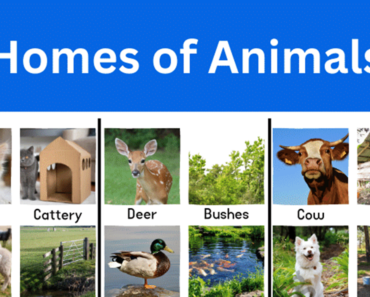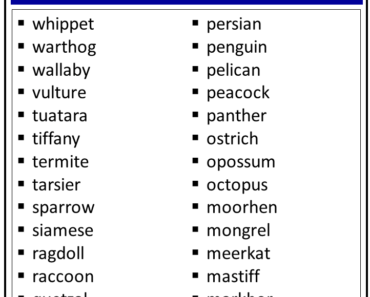In the big picture of life on Earth, there are some special animals that quietly do an important job: cleaning up after everyone else. They are called decomposer animals, and they play a crucial role in recycling nature’s leftovers. In this blog post, we’ll take a journey to discover these incredible creatures. From tiny bugs to powerful scavengers, let’s explore the hidden world of decomposers and learn how they help keep the circle of life going.
Decomposer Animals
Decomposer animals are nature’s recyclers. They are the organisms responsible for breaking down and decomposing dead plants, animals, and other organic matter. These unsung heroes include insects like beetles and worms, as well as larger scavengers like vultures and crabs. By breaking down organic material, they release nutrients back into the ecosystem, ensuring the cycle of life continues.
Must Read: Animals Name (Complete List)
Decomposer Animals Name
Below is the list of decomposer animals.
- Beetles
- Fly Larvae
- Fungi
- Microscopic organisms
- Millipedes
- Slugs
- Sow bugs
- Termites
- Worms
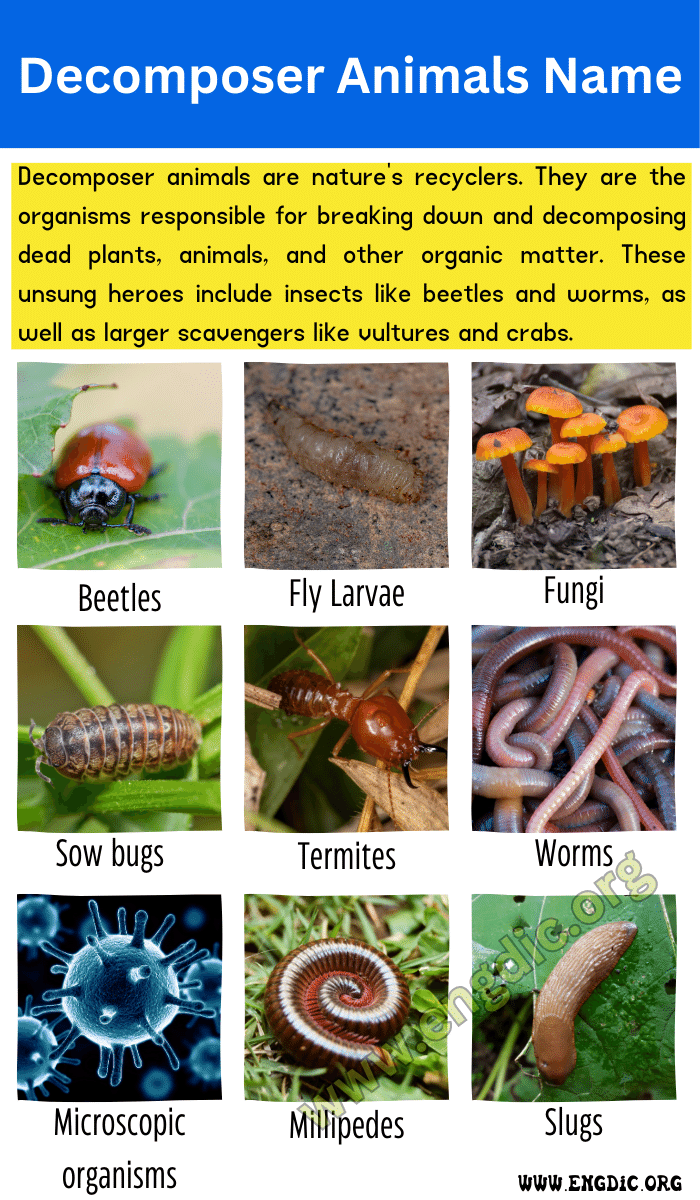
Beetles:
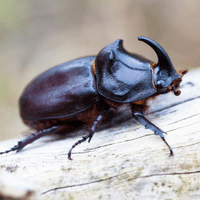
Beetles are a diverse group of decomposer animals that play a crucial role in breaking down organic matter. With their strong mandibles, they chew through decaying plant and animal material, aiding in the process of decomposition. Some beetle species, such as burying beetles, help by burying small carcasses, accelerating their decomposition, and recycling nutrients back into the ecosystem.
Fly Larvae:

Fly larvae, also known as maggots (check other insects name), are excellent decomposers. They feed on decaying organic matter, including dead animals and plant material. These voracious eaters quickly consume the decomposing material, breaking it down into smaller pieces and facilitating the decomposition process. Fly larvae are often found in compost piles and carcasses, where they contribute to nutrient cycling.
Fungi:

Fungi are an essential group of decomposers that specialize in breaking down dead organic matter. They secrete enzymes that break down complex compounds, such as lignin and cellulose, into simpler forms that can be absorbed by other organisms. Fungi, including mushrooms and molds, play a vital role in recycling nutrients and returning them to the soil, thus supporting the growth of new plants.
Microscopic organisms:

Microscopic organisms, such as bacteria and protozoa, are indispensable decomposers in various ecosystems. Bacteria break down organic matter by releasing enzymes that break down complex molecules, while protozoa consume these bacteria, recycling the nutrients present in the organic material. These tiny decomposers play a crucial role in nutrient cycling and maintaining the health of ecosystems.
Millipedes:
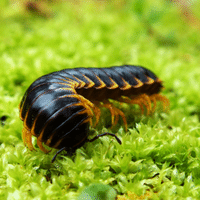
Millipedes are detritivores that feed on decaying plant matter, leaf litter, and other organic debris. They have mouthparts that allow them to chew through dead plant material, aiding in the breakdown process. As millipedes consume decaying matter, they break it down into smaller pieces, making it more accessible to other decomposers. They also help aerate the soil and enhance nutrient availability.
Slugs:
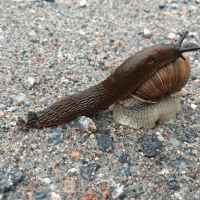
Slugs are often considered both decomposers and detritivores. They feed on decaying plant material, including fallen leaves and decaying fruits, contributing to the decomposition process. Slugs have a rasping mouthpart called a radula that helps them consume decaying matter. While their role as decomposers might be less prominent compared to other organisms, they still play a part in breaking down organic material.
Sow bugs:

Sow bugs, also known as woodlice or pill bugs, are crustaceans that aid in decomposition. They primarily consume decaying plant matter and organic debris on the forest floor. Sow bugs break down the dead material into smaller particles through their chewing mouthparts, promoting the decomposition process. They also enhance soil structure and nutrient cycling in terrestrial ecosystems.
Termites:

Termites are highly efficient decomposers, particularly known for breaking down wood and plant material. They have specialized gut bacteria that help them digest cellulose, a complex carbohydrate present in plant fibers. Termites excavate tunnels and galleries, creating a conducive environment for decomposition. Their activities play a significant role in recycling nutrients and breaking down dead plant matter in ecosystems.
Worms:
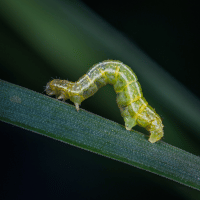
Worms, such as earthworms, are excellent decomposers that enhance soil fertility. They consume decaying organic matter and process it through their digestive system, breaking it down into nutrient-rich castings. Worms improve soil structure and aeration while releasing valuable nutrients into the soil. Their burrowing activities also facilitate the decomposition of organic material and contribute to nutrient cycling in ecosystems.
FAQS
Why Are Decomposers Important?
Decomposers are important because they break down dead organic matter, recycling nutrients back into the ecosystem and promoting the health of ecosystems.
What Do Decomposers Eat?
Decomposers primarily eat dead organic matter, including dead plants, animals, and other organic debris.
What Do Decomposers Do?
Decomposers break down dead organic matter into simpler forms through processes such as decomposition, digestion, and absorption, returning nutrients to the ecosystem and aiding in nutrient cycling.
Is Fungi A Decomposer?
Yes, fungi are decomposers. They play a vital role in decomposing dead organic matter, breaking down complex compounds such as lignin and cellulose, and releasing nutrients back into the ecosystem.


